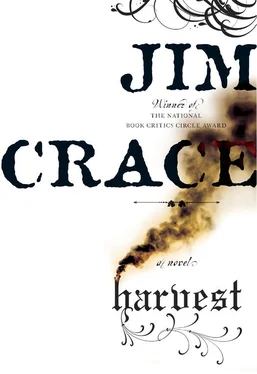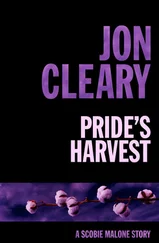“You mean the little man that died? Yes, that does seem likely, doesn’t it?”
“Who else? If you’ve been throttled in the pillory for burning doves, and half devoured by pigs, murdering a horse is just the sort of mischief you’d enjoy,” she says with certainty. “There’s motive, isn’t there?”
“The man is dead.”
“The dead men are the ones to fear. A soul can’t rest until it’s satisfied, until the fellow is revenged.”
“He’s far too short to reach the horse’s head.” I’m trying to be reasonable.
She stares as if I am the world’s buffoon. “Everybody’s short, when they’re kneeling down,” she says, and looks at me cock-eyed. Of course, she’s right. I’ve been half-witted. The horse wasn’t standing; it was down and sleeping when it died. It was in the hollows of the night. What does a horse do, then, other than to fold itself into the straw and sleep? The killer didn’t have to be familiar. The killer didn’t have to reach. The killer didn’t even have to lift that finger-stretching rock far from the ground. The killer might have used two hands. Far from being the work of a hefty, muscle-fisted man, the killer could have been a woman or a child. Not counting widow Gosse’s ghost and his pilloried companion but including Mr. Quill and Master Kent’s six manor house guests, there are more than sixty sons and daughters of Cain who might have crept back to their cot last night with horse blood on their hands and clothes.
Indeed, that is the stain that Master Jordan wants to chase, once everyone is gathered in the threshing house ready for another day of barley work. Horses have enormous pumping hearts. A loop of blood fountained out of Willowjack’s head the moment that the prong went in. The straw is black and sticky with its splash. Whoever was responsible for this death will not have escaped entirely dry and unspoiled. All the masters need to do is find the pile of red and sodden clothes. The cottagers are told, therefore, that none of them must stray a step beyond the barn today. Their dwellings and their gardens will be searched. And we must prepare ourselves, in the absence of a lawful gibbet, to see a neighbor hanging from an oak before the end of day.
“And who are you?” That is a question no one dares to ask as Master Jordan stands before them. The cousin does not even give his name or offer the briefest account of his status and intentions. All my neighbors see is a man of blunt authority attended by three menservants who are affecting to be dangerously bored. They all four look extremely clean and pale. Spotless is the word. No worthy flea would want to spend a night with them. The menservants are dressed in matching breeches, jerkins with flaxen collars and brimless caps, like foot soldiers. From behind, where I am standing at Master Kent’s shoulder, they are indistinguishable from one another. Their lord — for it must seem that he’s at least a lord — has thrown aside the leather riding coat and padded doublet he was wearing yesterday and, as befits the summer warmth, is attired more loosely in trunk-hose — or onion pants as they might as well be called — and an embroidered linen smock. There’s not a tuft of wool on him, I see. His beard is barbered and his hair, so far as we can tell, is pinned. But what holds our attention and most persuades he is a man we should not trifle with is his high-crowned hat, his copotain, which he’s adorned not only with the Jordan family badge but with both a feather and a gemstone clip. That hat alone says power, wealth and provenance. That hat alone could purchase each of us.
In truth, this lord, this gentleman, is having trouble keeping his hat in place. He has to raise his hand and hold its brim as he describes — in gestures and in words — what he expects from us today. In brief, he wants an end to all the nonsense that has disturbed our country peace so thoroughly of late. We are too far from “ordinance and regulation,” he says. We have forgotten Benefits of Law, Just Punishment, the Dues and Customs of all citizens “and countrymen,” he adds. So far “the reckoning,” for which we all could well be held to account, comprises only property of the manor house — some buildings and some creatures of great consequence.
“Someone among you here, beneath this roof, will be found and held responsible for the theft of a mare of great value,” he says. “That person cannot expect to walk these lanes tomorrow, nor should he hope to claim a holy burial … He will meet the rotting carcass of the horse he killed, in your charnel field. He will meet his brother miscreant too — the one who foolishly thought he could set fire to barns and doves and only pay the meager price of one week, at leisure in the pillory, but has instead today been dragged by his bloody heels to join the skeletons.”
I cannot help but look for the twins and Brooker Higgs among the silent gathering. When they’re not gaping, they’re swallowing. They’re picturing the pair of carcasses already at Turd and Turf and wondering which of them now standing in the barn will sleep forever with Willowjack and with the pig-chewed, throttled newcomer. But that’s the same for everybody here. It’s as clear as any thunder cloud that troubles are approaching fast, that lightning is bound to strike a villager. This high-hatted man, whoever he might be, whatever his conjunction with the Jordan family badge, will not be satisfied until the reckoning is paid.
Master Kent himself says nothing to explain. Everyone can tell by how he hangs his hands behind his back and bows his head, nodding too self-consciously — he’s nothing but a listener today — that, whoever this new gentleman might be, their own master of the manor is balancing on a lower rung than him, and knows it. This is a new experience, and baffling. No one has seen the master standing with such anxious deference before. We’re used to knowing he’s in charge even though he’s never been too keen to remind us of that fact. He has always tried to be an even-handed, subtle Caesar in our midst, more ready to achieve his purposes by throwing an arm around our shoulders than shouting in our ears. Our Caesar now seems powerless. Of course, he has been saddened by the loss of Willowjack and might have such a heavy heart that it has dragged his tongue into his throat. We can expect him soon to lift his head and take our reins again. But, no, this evident submission to the younger man is touching on the servile now. It’s almost fearful. And made all the more so by the other man’s officious bearing, his icy forthright manners which expect and get compliance from everybody. “God bless you all,” he says at last. “And God help one of you.”
Master Kent is glad to have me at his side once we have left the barn. He needs “a calming hand.” Not only has he lost his mare, he’s had to fight to save her body from the profiteers. “My cousin tells me I am wasteful, not to have the ‘useless’ carcass baked for its grease,” he says. “I told him that the horse was far too loyal and loved for such rewards.” And Master Jordan’s reply was that he himself had valued his mastiff, Blunt, just as much. He evidently was a dog as fierce and unimpeachable as any constable. But he still yielded thirteen pounds of grease when he was too old for the job and had to be dispatched.
“I am improvident for not putting Willowjack to the same good use,” adds my master, leaning closer so that he is not overheard. “But I have insisted on my way, and won the argument … for once. If only I could always win the argument with cousin Edmund …” He puts a finger to his lips, nervous suddenly. “The two of us should hold our tongues. You understand?”
My master assumes that Mr. Quill has, by now, explained to me the cause and reason of his cousin’s country trip. He is asking that I keep secret from my neighbors not only what surely now seems obvious — his cousin’s lawful usurpment of the manor and the land — but also the details of our coming woolly plight. He hopes to win some further arguments, before any cloven hoofs make their first imprint on our land. He means first to negotiate some blunting of his cousin’s blades before he talks to us, his friends. It will have been his plan, I’m sure, as soon as he was warned, before the barley was cleared, that Master Jordan was descending by road to harvest his inheritance, to make a fight of it, to protect us with his arguments, to find some means of, say, saving at least some common ground where we — the shearers and the shepherds of next year — can let loose our beasts, to do his best, as well, to preserve some forestry. “So long as all my neighbors here are safe,” he’d say, “and they have work and food and dwellings that are assured until the thresholds of their graves, then I am equally assured your flock of sheep will meet with hospitality …”
Читать дальше












